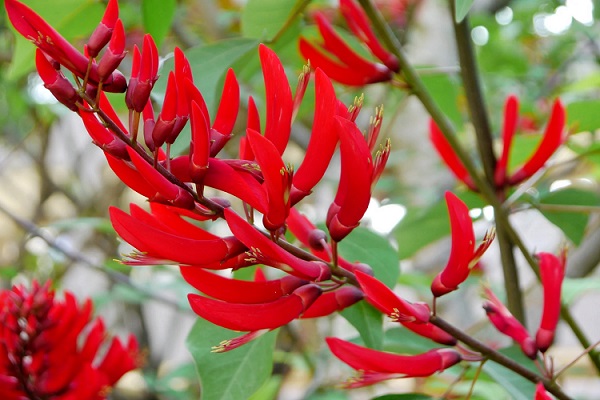Indonesian and Malaysian Researchers Discover Herb That Can Inhibit SARS-CoV-2 and Has Wide Antimicrobial Properties
Nikhil Prasad Fact checked by:Thailand Medical News Team Oct 03, 2025 4 months, 1 week, 4 days, 1 hour, 34 minutes ago
Medical News: Ancient Plant with Modern Promise
A group of Indonesian and Malaysian scientists have uncovered powerful medicinal potential in plants belonging to the Erythrina genus, commonly known as coral trees. These plants, traditionally used in various cultures for healing, have now been shown through scientific study to possess strong antiviral properties, including activity against SARS-CoV-2, the virus responsible for COVID-19. They also display antibacterial, antifungal, and even antimalarial activity, making them a highly promising source of new treatments. According to this
Medical News report, the findings highlight how natural products could help in the fight against drug-resistant infections and emerging viruses.
 Indonesian and Malaysian Researchers Discover Herb That Can Inhibit SARS-CoV-2 and Has Wide Antimicrobial Properties
Research Teams and Their Work
Indonesian and Malaysian Researchers Discover Herb That Can Inhibit SARS-CoV-2 and Has Wide Antimicrobial Properties
Research Teams and Their Work
The study was carried out by researchers from the Department of Pharmaceutical Analysis and Medicinal Chemistry, Faculty of Pharmacy, Universitas Padjadjaran, Indonesia, together with the Institute of Biological Sciences, Faculty of Science, Universiti Malaya, Malaysia. The scientists reviewed decades of published data and analyzed the specific compounds found in Erythrina species, focusing on their effects against a wide range of pathogens.
They discovered that certain compounds from Erythrina plants, such as gangetin from Erythrina sigmoidea and gangetinin from Erythrina subumbrans, showed the ability to inhibit SARS-CoV-2. Computer-based drug modeling also revealed that butein, a compound in the genus, could block the virus’s RNA-dependent RNA polymerase (RdRp), an enzyme essential for viral replication. This is the same enzyme targeted by the COVID-19 drug remdesivir, suggesting that butein and related natural compounds may become candidates for future antiviral drugs.
Broad-Spectrum Antimicrobial Power
Beyond their impact on viruses, extracts from Erythrina plants demonstrated remarkable antibacterial effects, particularly against Staphylococcus aureus, a bacterium that has developed resistance to many standard antibiotics. For instance, extracts of Erythrina caffra were able to kill the bacteria at extremely low concentrations, in some cases as low as 0.313 micrograms per milliliter. Similarly, compounds such as ericristagallin from Erythrina subumbrans were found to be highly effective against dangerous drug-resistant strains like MRSA (methicillin-resistant Staphylococcus aureus) and VRSA (vancomycin-resistant S. aureus).
The antifungal potential of these plants was also clear. Erythrina senegalensis, for example, showed strong effects against Candida albicans, a fungus responsible for common yeast infections, while other compounds were active against molds and other dangerous fungi. Furthermore, extracts from certain Erythrina species were shown to kill Plasmodium falciparum, the parasite that causes malaria, at levels comparable to some existing antimalarial drugs.
Why This Matters
&l
t;br />
The global rise of antibiotic resistance and the limited effectiveness of many antiviral drugs has created an urgent need for new treatments. The discovery of bioactive compounds in Erythrina not only offers hope in the ongoing battle against COVID-19 but also provides potential weapons against a broad range of infectious diseases. The unique chemical structures of the compounds in these plants allow them to work in different ways, from interfering with viral enzymes to disrupting bacterial cell walls and fungal growth.
Moving Forward
While these laboratory findings are highly promising, the researchers emphasize that further in vivo testing and clinical trials are required before any new drugs can be developed. Still, the study highlights the importance of looking to nature for solutions, particularly in regions like Southeast Asia where traditional medicinal plants remain underexplored.
The implications are far-reaching. If developed into safe and effective therapies, Erythrina-derived compounds could provide alternative treatments for COVID-19, resistant bacterial infections, fungal diseases, and even malaria. At a time when global health systems are under immense pressure, such discoveries could help reshape future strategies in infectious disease management.
The study findings were published in the peer reviewed journal: Plants.
https://www.mdpi.com/2223-7747/14/19/3053
For the latest news, keep on logging to Thailand
Medical News.
Read Also:
https://www.thailandmedical.news/news/diphyllin-s-two-way-defense-against-covid-19-infections
https://www.thailandmedical.news/news/terpenes-from-plants-belonging-to-the-fabaceae-family-show-potential-to-treat-covid-19
https://www.thailandmedical.news/news/philippine-medicinal-plants-show-strong-potential-against-covid-19
https://www.thailandmedical.news/articles/herbs-and-phytochemicals
